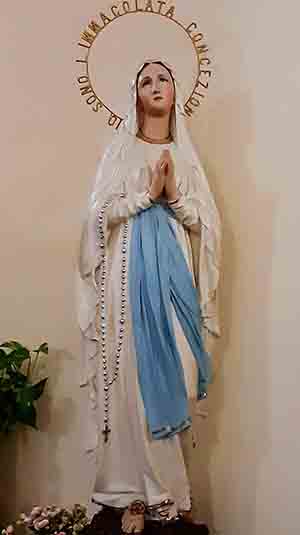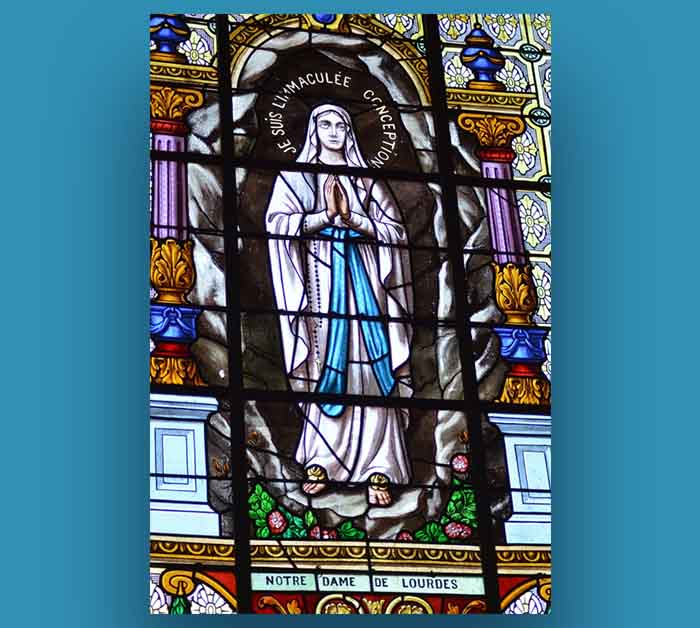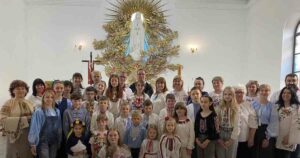Hyperdulia
Many non-Catholics often accuse Catholics of worshipping the Blessed Virgin Mary. They are greatly mistaken, of course. We adore God alone. We venerate the saints, and, in a particular manner, the Blessed Virgin Mary.
In theology, we employ the term ‘latria’ to describe our adoration of God. For veneration of the saints the term employed is ‘dulia.’ The Blessed Virgin Mary is more than just a saint – she is unique; and so a unique term is employed when referring to the veneration we pay to her: ‘hyperdulia.’
St. Maximilian Explains
During the course of his missionary work, St. Maximilian M. Kolbe often came up against this same misconception amongst non-Catholics. And in his own charitable way, he would set the record straight for them, making the Catholic position very clear. Here is one of his writings published in Mugenzai, Japan, in 1936 [Scritti Kolbe SK1204]:
"I heard that whilst travelling through Shimonoseki recently, someone asked some passersby where he could find a Catholic church. They all, however, answered that they did not know. Finally, one of them said, 'Oh, it is the religion of Mary, is it?' and immediately informed the traveller how to reach the Catholic church.
The faithful of the Catholic Church do not ever call their Church 'the Religion of Mary.' However, they do venerate the Most Holy Virgin Mary very much, whilst those who are not familiar with the catechism regard them suspiciously.
Here, therefore, is an explanation: The Catholic faithful venerate the Divine Mother fervently, but without considering her as God. The Most Holy Virgin Mary, who is a creature of God, was born twenty centuries ago from two parents like all other people. She is, therefore, only a human person. Why, therefore, is she venerated? The Catholic Church teaches that Jesus Christ, though He is the eternal and infinite God, was born in time and wanted to choose Mary to be His Mother, became flesh in her womb, and was born of her. Consequently, the Church teaches that Mary is the Mother of God. This is the reason behind veneration towards her. Besides, she is an incomparable mirror of any virtue. The Church, therefore, venerates and admires her.

With the words, "And coming to her, the angel said, 'Hail, O full of grace! The Lord is with you. Blessed are you amongst women' " [Luke 1:28], the Holy Gospel teaches how she should be venerated.
Sanctification depends upon divine grace. The divine messenger greeted her with the words 'full of grace', thus revealing that the Most Holy Virgin Mary was totally perfect, holy. When the Divine Mother proclaimed the Magnificat, she foretold the veneration with which she was to be surrounded in the future: 'My soul proclaims the greatness of the Lord; my spirit rejoices in God my Saviour. For He has looked upon His handmaid's lowliness; behold, from now on will all ages call me blessed. The Mighty One has done great things for me, and Holy is His name' [Luke 1: 46 - 49].
The veneration bestowed upon Mary is evident in the drawings found in the catacombs, made during the first persecutions of the Church, seventeen or eighteen centuries ago, that is in the first, second and third centuries of the Christian era. After the persecutions were ended, for fifteen centuries, the veneration towards the Mother of God became ever more manifest in paintings, statues and churches. When about four centuries ago a heretic opposed the devotion to the Mother of God, the Catholic faithful started to repeat fervently several times a day the prayer 'Hail Mary', which says, 'Hail Mary, full of grace, the Lord is with you. Blessed are you amongst women, and blessed is the fruit of your womb, Jesus.' And they go on saying, 'Holy Mary, Mother of God, pray for us sinners, now and at the hour of our death. Amen.' This is how they venerate Mary, the Mother of God."
Epilogue
We are approaching one of the great Marian feasts of the Church’s calendar, in honour of the Full of Grace, the Immaculate Conception. Let us meditate deeply on the aforementioned words of St. Maximilian.
– friar Solanus Mary, OFM Conv.



